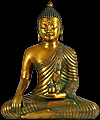Diamond SutraThe Vajracchedika Prajna paramita Sutra |
 |
|
|
This is what I heard one time when the Buddha was staying in the monastery in Anathapindika's park in the Jeta Grove near Shravasti with a community of 1,250 Bhikshus, fully ordained monks.
That day, when it was time to make the round for alms, the Buddha put on his sanghati robe and, holding his bowl, went into the city of Shravasti to seek alms food, going from house to house. When the alms round was completed, he returned to the monastery to eat the midday meal. Then he put away his sanghati robe and his bowl, washed his feet, arranged his cushion, and sat down.
At that time, the Venerable Subhuti stood up, bared his right shoulder, put his knee on the ground, and, folding his palms respectfully, said to the Buddha, "World-Honored One, it is rare to find someone like you. You always support and show special confidence in the bodhisattvas.
"World-Honored One, if sons and daughters of good families want to give rise to the highest, most fulfilled, awakened mind, what should they rely on and what should they do to master their thinking?"
The Buddha replied, "Well said, Subhuti! What you have said is absolutely correct. The Tathagata always supports and shows special confidence in the bodhisattvas. Please listen
with all of your attention and the Tathagata will respond to your question. If daughters and sons of good families want to give rise to the highest, most fulfilled, awakened mind, they should rely on the following way."
The Venerable Subhuti said, "Lord, we are so happy to hear your teachings."
The Buddha said to Subhuti, "This is how the bodhisattva Mahasattvas master their thinking. 'However many species of living beings there are-whether born from eggs, from the womb, from moisture, or spontaneously; whether they have form or do not have form; whether they have perceptions or do not have perceptions; or whether it cannot be said of them that they have perceptions or
that they do not have perceptions, we must lead all these beings to the ultimate nirvana so that they can be liberated. And when this innumerable, immeasurable, infinite number of beings has become liberated, we do not, in truth, think that a single being has been liberated,'
"Why is this so? If, Subhuti, a bodhisattva holds on to the idea that a self, a person, a living being, or a life span exists, that person is not an authentic bodhisattva."
"Moreover, Subhuti, when a bodhisattva practices generosity, he does not rely on any object-that is to say he does not rely on any form, sound, smell, taste, tactile object, or dharma-to practice generosity. That, Subhuti, is the spirit in which a bodhisattva should practice generosity, not relying on signs. Why? If a bodhisattva practices generosity without relying on signs, the happiness that results cannot be conceived of or measured. Subhuti, do you think that the space in the Eastern Quarter can be measured?"
"No, World-Honored One."
"Subhuti, can space in the Western, Southern, and Northern Quarters, above and below be measured?"
"No, World-Honored One."
"Subhuti, if a bodhisattva does not rely on any concept when practicing generosity, then the happiness that results from that virtuous act is as great as space. It cannot be measured. Subhuti, the bodhisattvas should let their minds dwell in the teachings I have just given."
"What do you think, Subhuti? Is it possible to grasp the Tathagata by means of bodily signs?"
"No, World-Honored One. When the Tathagata speaks of bodily signs, there are no signs being talked about."
The Buddha said to Subhuti: "In a place where there is something that can be distinguished by signs, in that place there is deception. If you can see the sign less nature of signs, then you can see the Tathagata."
The Venerable Subhuti said to the Buddha, "In times to come, will there be people who, when they hear these teachings, have real faith and confidence in them?"
The Buddha replied, "Do not speak that way, Subhuti. Five hundred years after the Tathagata has passed away, there will still be people who enjoy the happiness that comes from
observing the precepts. When such people hear these words, they will have faith and confidence that here is the truth. We should know that such people have sown seeds not only during the lifetime of one Buddha, or even two, three, four, or five Buddhas, but have, in truth, planted wholesome seeds during the lifetimes of tens of thousands of Buddhas. Anyone who, for only a second, gives rise to a pure and clear confidence upon hearing these words of the Tathagata, the Tathagata sees and knows that person, and he or she will attain immeasurable happiness because of this understanding. Why?
"Because that kind of person is not caught up in the idea of a self, a person, a living being, or a life span. They are not caught up in the idea of a dharma or the idea of a non-dharma. They are not caught up in the notion that this is a sign and that is not a sign. Why? If you are caught up in the idea of a dharma, you are also caught up in the ideas of a self, a person, a living being, and a life span. If you are caught up in the idea that there is no dharma, you are still caught up in the ideas of a self, a person, a living being, and a life span. That is why we should not get caught up in dharmas or in the idea that dharmas do not exist. This is the hidden meaning when the Tathagata says, 'Bhikshus, you should know that all of the teachings I give to you are a raft.¹ All
teachings must be abandoned, not to mention non-teachings."
"What do you think, Subhuti, has the Tathagata arrived at the highest, most ful-filled, awakened mind? Does the Tathagata give any teaching?"
The Venerable Subhuti replied, "As far as I have understood the Lord Buddha's teachings, there is no independently existing object of mind called the highest, most ful-filled, awakened mind, nor is there any independently existing teaching that the Tathagata gives. Why? The teachings that the Tathagata has realized and spoken of cannot be conceived of as separate, independent existences and therefore cannot be described. The Tathagatas teaching is not self-existent nor is it non-self-existent. Why? Because the noble teachers are only distinguished from others in terms of the unconditioned."
"What do you think, Subhuti? If someone were to fill the 3,000 chiliocosms with the seven precious treasures as an act of generosity, would that person bring much happiness by this virtuous act?"
The Venerable Subhuti replied, "Yes, World-Honored One. It is because the very natures of virtue and happiness are not virtue and happiness that the Tathagata is able to speak about virtue and happiness."
The Buddha said, "On the other hand, if there is someone who accepts these teachings and puts them into practice, even if only a gatha of four lines, and explains them to someone else, the happiness brought about by this virtuous act far exceeds the happiness brought about by giving the seven precious treasures. Why? Because, Subhuti, all Buddhas and the dharma of the highest, most
fulfilled, awakened mind of all Buddhas arise from these teachings. Subhuti, what is called Buddha dharma is everything that is not Buddha dharma."
"What do you think, Subhuti? Does a Stream-Enterer think, 'I have attained the fruit of stream-entry.'? "
Subhuti replied, "No, World-Honored One. Why? Stream-Enterer means to enter the stream, but in fact there is no stream to enter. One does not enter a stream that is form, nor a stream that is sound, smell, taste, touch, or object of mind. That is what we mean when we say entering a stream."
"What do you think, Subhuti? Does a Once-Returner think, 'I have attained the fruit of Once-Returning.'?"
Subhuti replied, "No, World-Honored One. Why? Once-Returner means to go and return once more, but in truth there is no going just as there is no returning. That is what we mean when we say Once-Returner."
"What do you think, Subhuti? Does a Non-Returner think like this, 'l have attained the fruit of No-Return.'?"
Subhuti replied, "No, World-Honored One. Why? No-Return means not to return to this world, but in fact there cannot be any Non-Returning. That is what we mean when we say Non-Returner."
"What do you think, Subhuti? Does an Arhat think like this, 'I have attained the fruit of Arhatship¹?"
Subhuti replied, "No, World-Honored One. Why? There is no separately existing thing that can be called Arhat. If an Arhat gives rise to the thought that he has attained the fruit of Arhat-ship, then he is still caught up in the idea of a self, a person, a living being, and a life span. World-Honored One, you have often said that I have attained the concentration of peaceful abiding and that in the community, I am the Arhat who has most transformed need and desire. World-Honored One, if I were to think that I had attained the fruit of Arhat-ship, you certainly would not have said that I love to dwell in the concentration of peaceful abiding."
The Buddha asked Subhuti, "In ancient times when the Tathagata practiced under Buddha Dipankara, did he attain anything?"
Subhuti answered, "No, World-Honored One. In ancient times when the Tathágata was practicing under Buddha Dipankara, he did not attain anything."
"What do you think, Subhuti? Does a bodhisattva create a serene and beautiful Buddha field?"
"No, World-Honored One. Why? To create a serene and beautiful Buddha field is not in fact creating a serene and beautiful Buddha field. That is why it is called creating a serene and beautiful Buddha field."
The Buddha said, "So, Subhuti, all the bodhisattva Mahasattvas should give rise to a pure and clear intention in this spirit. When they give rise to this intention, they should not rely on forms, sounds, smells, tastes, tactile objects, or objects of mind. They should give rise to an intention with their minds not dwelling anywhere.'
"Subhuti, if there were someone with a body as big as Mount Sumeru, would you say that his was a large body?"
Subhuti answered, "Yes, World-Honored One, very large. Why? What the Tathagata says is not a large body, that is known as a large body."
"Subhuti, if there were as many Ganges Rivers as the number of grains of sand in the Ganges, would you say that the number of grains of sand in all those Ganges Rivers is very many'"
Subhuti answered, "Very many indeed, World-Honored One. If the number of Ganges Rivers were huge, how much more so the number of grains of sand in all those Ganges Rivers."
"Subhuti, now I want to ask you this: if a daughter or son of good family were to fill the 3,000 chiliocosms with as many precious jewels as the number of grains of sand in all the Ganges Rivers as an act of generosity, would that person bring much happiness by her virtuous act?"
Subhuti replied, "Very much, World-Honored One."
The Buddha said to Subhuti, "If a daughter or son of a good family knows how to accept, practice, and explain this sutra to others, even if it is a gatha of four lines, the happiness that results from this virtuous act would be far greater."
"Furthermore, Subhuti, any plot of land on which this sutra is proclaimed, even if only one gatha of four lines, will be a land where gods, men, and asuras will come to make offerings just as they make offerings to a stupa of the Buddha. If the plot of land is regarded as that sacred, how much more so the person who practices and recites this sutra. Subhuti, you should know that that person attains something rare and profound. Wherever this sutra is kept is a sacred site enshrining the presence of the Buddha or one of the Buddha's great disciples."
After that, Subhuti asked the Buddha, "What should this sutra be called and how should we act regarding its teachings?"
The Buddha replied, "This sutra should be called The Diamond that Cuts through Illusion because it has the capacity to cut through allusions and afflictions and bring us to the shore of liberation. Please use this title and practice according to its deepest meaning. Why? What the Tathagata has called the highest, transcendent understanding is not, in fact, the highest, transcendent
understanding. That is why it is truly the highest, transcendent understanding:"
The Buddha asked, "What do you think, Subhuti? Is there any dharma that the Tathagata teaches?"
Subhuti replied, "The Tathagata has nothing to teach, World-Honored One."
"What do you think, Subhuti? Are there many particles of dust in the 3,000 chiliocosms?"
"Very many, World-Honored One."
"Subhuti, the Tathágata says that these particles of dust are not particles of dust, That is why they are truly particles of dust. And what the Tathagata calls chiliocosms are not in fact chiliocosms. That is why they are called chiliocosms"
"What do you think, Subhuti? Can the Tathagata be recognized by the possession of the thirty-two marks?"
The Venerable Subhuti replied, "No, World-Honored One. Why? Because what the Tathagata calls the thirty-two marks are not essentially marks and that is why the Tathagata calls them the thirty-two marks."
"Subhuti, if as many times as there are grains of sand in the Ganges a son or daughter of a good family gives up his or her life as an act of generosity and if another daughter or son of a good family knows how to accept, practice, and explain this sutra to others, even if only a gatha of four lines, the happiness resulting from explaining this sutra is far greater."
When he had heard this much and penetrated deeply into its significance, the Venerable Subhuti was moved to tears. He said, "World-Honored One, you are truly rare in this world. Since the day I attained the eyes of understanding, thanks to the guidance of the Buddha, I have never before heard teachings so deep and wonderful as these. World-Honored One, if someone hears this sutra, has pure and clear confidence in it, and arrives at insight into the truth, that person will realize the rarest kind of virtue. World-Honored One, that insight into the truth is essentially not insight. That is what the Tathagata calls insight into the truth.
"World-Honored One, today it is not difficult for me to hear this wonderful sutra, have confidence in it, understand it, accept it, and put it into practice. But in the future, in 500 years, if there is someone who can hear this sutra, have confidence in it, understand it, accept it, and put it into practice, then certainly the existence of someone like that will be great and rare. Why? That person will not be dominated by the idea of a self, a person, a living being, or a life span. Why? The idea of a self is not an idea, and the ideas of a person, a living being, and a life span are not ideas either. Why? Buddhas are called Buddhas because they are free of ideas."
"The Buddha said to Subhuti, "That is quite right. If someone hears this sutra and is not terrified or afraid, he or she is rare. Why? Subhuti, what the Tathagata calls parama-paramita, the highest transcendence, is not essentially the highest transcendence, and that is why it is called the highest transcendence.
"Subhuti, the Tathagata has said that what is called transcendent endurance is not transcendent endurance. That is why it is called transcendent endurance. Why? Subhuti, thousands of lifetimes ago when my body was cut into pieces by King Kalinga, I was not caught in the idea of a self, a person, a living being, or a life span. If, at that time, I had been caught up in any of those ideas, I would have felt anger and ill-will against the king.
"I also remember in ancient times, for 500 lifetimes, I practiced transcendent endurance by not being caught up in the idea of a self, a person, a living being, or a life span. So, Subhuti, when a bodhisattva gives rise to the unequalled mind of awakening, he has to give up all ideas. He cannot not rely on forms when he gives rise to that mind, nor on sounds, smells, tastes, tactile
objects, or objects of mind. He can only give rise to that mind that is not caught up in anything.
"The Tathágata has said that all notions are not notions and that all living beings are not living beings. Subhuti, the Tathagata is one who speaks of things as they are, speaks what is true, and speaks in accord with reality. He does not speak deceptively or to please people. Subhuti, if we say that the Tathagata has realized a teaching, that teaching is neither graspable nor deceptive.
"Subhuti, a bodhisattva who still depends on notions to practice generosity is like someone walking in the dark. He will not see anything. But when a bodhisattva does not depend on notions to practice generosity, he is like someone with good eyesight walking under the bright light of the sun. He can see all shapes and colors.
"Subhuti, if in the future there is any daughter or son of good family who has the capacity to accept, read, and put into practice this sutra, the Tathagata will see that person with his eyes of understanding. The Tathagata will know that person, and that person will realize the measureless, limitless fruit of
her or his virtuous act.

